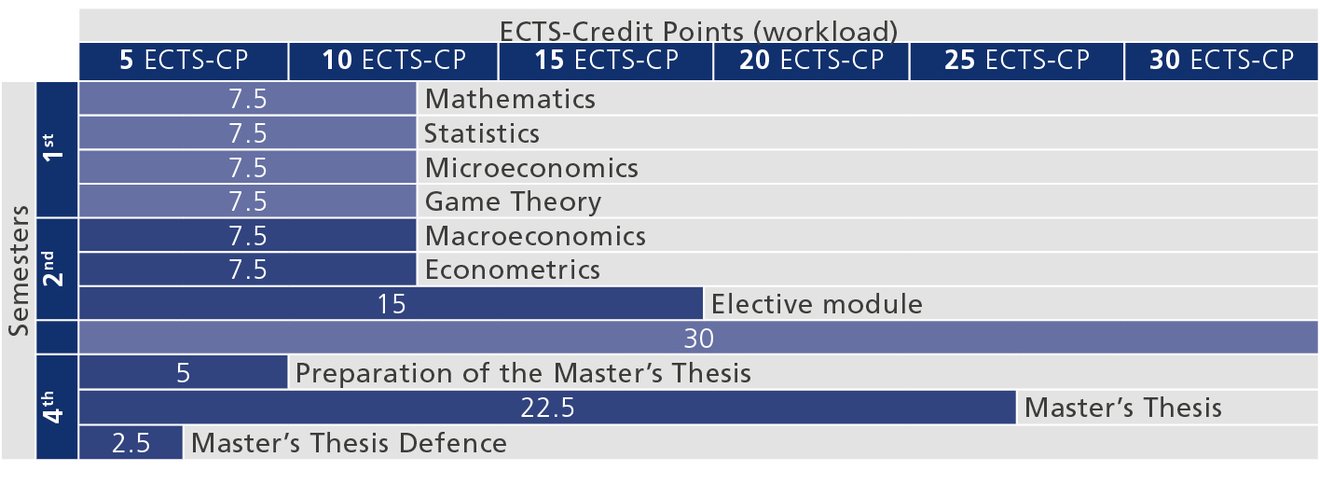Master’s Programme Experimental and Empirical Economics
Curriculum (2022W)
Master of Science
Duration/ECTS-AP
4 semesters/120 ECTS-Credits
Mode of Study
Full-Time
Language
English
Requirements
Relevant bachelor's degree or equivalent and Language Certificates
Faculty
Faculty of Economics and Statistics
Qualification Level
Master (Second Cycle)
ISCED-11: Level 7, EQF/NQF: Level 7
ISCED-F
0311 Economics
Study Code
UC 066 975
The curriculum is the basis of a degree programme. A look at the curriculum for the Master’s Programme Experimental and Empirical Economics gives you a detailed overview of the structure, content, examination regulations and qualification profile of this Master's degree.
The curriculum can clarify several important questions before you start your studies. For example, which criteria must be fulfilled for enrolment in the Master’s Programme Experimental and Empirical Economics, how long the programme lasts, which modules must be completed and much more.
The 2022W curriculum currently applies to the Master’s Programme Experimental and Empirical Economics.
Information on the Curriculum (2022W)
The complete version of the curriculum reflects the currently valid version of the curriculum. It is for informational purposes only and is not legally binding. The legally binding version of the curriculum, including any amendments, may be found in the University of Innsbruck Bulletins.
In order to determine which version of the curriculum is applicable in your case, see the Catalogue of Studies, available at: https://lfuonline.uibk.ac.at/public/lfuonline_meinestudien.studienblatt
Section: Current Curriculum version.
Requirements
Relevant bachelor's resp. diploma degrees at the University of Innsbruck:
- Bachelor's Programme Management and Economics
- Bachelor's Programme Economy, Health and Sports Tourism
Proof of general university entrance qualification:
The general university entrance qualification for admission to a master's programme must be proven by the completion of a subject-related bachelor's programme, another subject-related programme of at least the same higher education level at a recognised domestic or foreign post-secondary educational institution, or a program defined in the curriculum of the master's programme. In order to understand the course content of the Master's programme in Experimental and Empirical Economics, knowledge of the basic methods of econometrics and analytical and methodological skills for solving quantitative problems are required. This knowledge is deemed to have been acquired if courses totalling 5 ECTS-Credits in econometrics have been successfully completed. To compensate for significant differences in subject matter, supplementary examinations (maximum 30 ECTS credits) may be prescribed, which must be taken by the end of the second semester of the master's programme.
The rectorate may determine which of these supplementary examinations are prerequisites for taking examinations provided for in the curriculum of the master's programme.
In the course of the proof of the general university entrance qualification, the completion of the following core areas within the framework of the completed bachelor's degree programme shall be examined in any case:
- 5.0 ECTS-Credits Core Area:Theory of Economic Decisions
- 5.0 ECTS-Credits Core Area: Macroeconomics
- 5.0 ECTS-Credits Core Area: Economics and the Public Sector
- 5.0 ECTS-Credits Core Area: Economic Theory
Recommended Course Sequence
The exemplary course sequence given below is recommended for full-time students beginning their study programme in the winter semester. The table shows one possible course sequence for the bachelor's programme and is not compulsory. Delays resulting from repeated examinations are not taken into account.
The standard duration of the study programme is 4 semesters or 120 ECTS-Credits, whereby according to the Universities Act of 2002, a workload of 1,500 (real) hours per academic year must be fulfilled, corresponding to 60 ECTS-Credits (one ECTS-Credit is equivalent to a workload of 25 hours).
7.5 ECTS-Credits: Mathematics
7.5 ECTS-Credits: Statistics
7.5 ECTS-Credits: Microeconomics
7.5 ECTS-Credits: Game Theory
7.5 ECTS-Credits: Macroeconomics
7.5 ECTS-Credits: Econometrics
15.0 ECTS-Credits: Elective module
30.0 ECTS-Credits: Elective modules
5.0 ECTS-Credits: Preparation of the Master’s Thesis
27.5 ECTS-Credits: Master’s Thesis
2.5 ECTS-Credits: Master’s Thesis Defence

| Semester | ECTS-AP | Titel |
|---|---|---|
Minor
As part of the Master’s Programme, a Minor of 30 ECTS-Credits can be completed.
More information and a list of possible Minors can be found at:
https://www.uibk.ac.at/studium/angebot/wahlpakete/

Instead of the elective module acc. to §8 par. 2 no. 6 (Interdisciplinary Skills) and the Individual Choice of Specialisation acc. to §8 par. 2 no. 7, a Minor for master’s programmes or the respective parts of it may be passed, providing the availability of places.
Information about examination regulations, assessment and grading
Examination regulations
The examination regulation is an integral part of the curriculum, detailed information can be found under the paragraph examination regulations.
The grade distribution table is a statistical representation of the distribution of all successfully completed examinations in a given programme of study or subject (based on all registered students for the programme or subject). The grade distribution table is updated in regular intervals.
| Austrian grading scheme | Definition | %-age | ||
| 1 | EXCELLENT | 41.8 | = 100% | |
| 2 | GOOD | 30.3 | ||
| 3 | SATISFACTORY | 16.9 | ||
| 4 | SUFFICIENT | 11.0 | ||
| 5 | INSUFFICIENT |
March 2025
Overall classification of the qualification
Not applicable
Explanation: An overall classification (mit Auszeichnung bestanden/pass with distinction, bestanden/pass, nicht bestanden/fail) – is awarded only for examinations that conclude a programme of study and consist of more than one subject (an examination of this type is not specified in the curriculum of this programme of study).
Forms
- Assessment of the compulsory module: Preparation of the Master’s Thesis
- Cover Sheet for the Master's Thesis
- Recognition of exams AND Supplementary Sheet
Forms and Guideline for submitting the Master's Thesis (valid since 01.11.2023)
Contact and Information
Examination Office
Location Universitätsstraße 15
Associate Dean of Studies
assoz.-Prof. Mag. Mag. Dr. Andrea Leiter-Scheiring
Dean of Studies
assoz.-Prof. Mag. Dr. Nikolaus Umlauf
Information about the Programme (in German only)
- ONLINE-Registration for modules
- Registration dates and information on the computer registration
- Onboarding and Mentoring (OLAT, only accessible for people with a valid c-identification of the University of Innsbruck)
